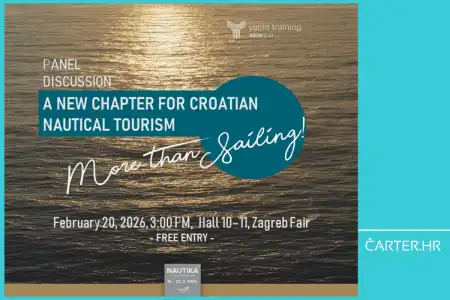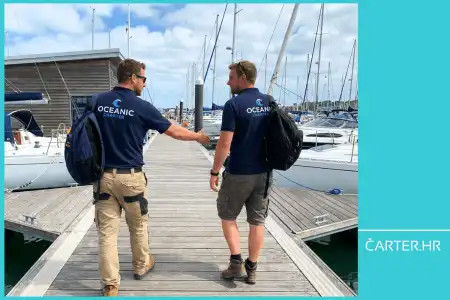
- 06.06.2023.
- News, Management
It seems that artificial intelligence tools have become prevalent in all industries. One of the fears that has emerged is whether AI will completely replace us. Should nautical charter be afraid of what tomorrow brings? What about the demand in the yacht charter industry? What results are projected for the season?
Although AI tools have been developing for a long time, in the past six months, tools like CHAT GPT have taken the public space by storm. They can generate not only text but also images, music, and other multimedia content if you express your desires accurately enough.
For people who are generally enthusiastic about all innovations, it has brought excitement about what it can do (wooohooo!)... while for those who are more cautious, it has caused worrying thoughts about the potential misuse of this and other AI tools and the possible end of employment in their respective industries.
It is logical to ask: to what extent will it impact the reduction of available jobs in yacht charter?!?
Yacht charter and artificial intelligence
This industry doesn't have too many reasons to worry, even in its marketing aspect, because of one obvious fact - there are few industries where personal experience, creativity, and service quality have such a significant impact on the final result. Moreover, it is a high-revenue activity, so why tamper with something that is already working quite well?!?
Nothing can replace a good sailor, skipper, hostess, charter base manager, promotional activities manager, and so on.
Because no matter how much the doomsday scenario is emphasized, AI tools produce good results only to the extent that creative people utilize them.
There are also economic and logistical reasons that will be debated. The potential cost of implementing systems powered by AI software is very high, and they would perform specific tasks such as interior and exterior cleaning, bed arrangement, and handling other cabin spaces. It would also mean occupying additional valuable space, which is already a compromise that is generally avoided if not necessary.
AI tools have much greater potential in maritime transportation. Container shipping has been using them for years in loading and unloading operations.
In the end, even though they can perform millions of operations per second, even Terminators were brought down by the wit of humans they threatened.
Never better season?
According to information gathered by the Croatian Tourist Board from Croatian airports, Croatia will be connected to over 483 unique airline routes during the summer flight schedule, linking 8 domestic airports with as many as 130 cities worldwide.
The largest number of direct air routes will connect Croatia with Germany, the United Kingdom, France, the Netherlands, and Italy.
Air transport plays a crucial role in connecting Croatia with the world, resulting in significantly better transportation connectivity of Croatian destinations compared to 2022. This argument supports the announcements of an unprecedentedly successful tourist season, particularly in southern Dalmatia.
If all planned routes are realized, it would represent a double-digit growth rate in the number of aviation operations compared to the summer flight schedule in 2022.
Based on available data and announcements, the highest number of air operations is expected at Split Airport (32%), followed by Zagreb (30%) and Dubrovnik (22%). During the summer flight season, direct connections are planned between Croatia and 38 countries, mostly in Europe, while connections with destinations on other continents are anticipated from markets such as the United States, Canada, Israel, Qatar, and the UAE.
What about nautical tourism in Croatia?
That's what can be said in general about Croatian tourism.
But what about nautical tourism? It is also expecting excellent results and never better demand, thank you for asking.
Čarter.hr has been a serious media outlet since its inception, and in that tone, we have not succumbed to catastrophic predictions of recession and the like. We're not an AI tool (fortunately), but we follow trends and experiences from the recent and more distant past, and if there's one thing we're certain about, it's that domestic nautical tourism is the sector that experiences the least decline and recovers the fastest. This was evident even on a quarterly basis, as demonstrated last year.
Croatia was the most popular country for nautical charter last year, accounting for a staggering 38.52% of global bookings. The leading competitor, Greece, had a 29.40% share in this category, which emphasizes the significance of Croatia's performance.
In addition to its picturesque and diverse coastline, good transportation connectivity, and proximity to source markets, what tips the scales is the growing service quality and the proximity of marinas to scenic cities. The increase in the number of airline routes will also be beneficial.
The numbers support our claim.
In the ranking of the top 10 embarkation ports in 2022, as many as 7 are located on the eastern Adriatic: Trogir, Sukošan, Biograd, Šibenik, Pula, Kaštel Gomilica, and Split. An equal number of Croatian marinas were in the top 10, with D-Marin in Sukošan, Marina Kornati in Biograd, and Marina Kaštela ranking from 3rd to 5th place.
What we need to continue doing is insisting on improving service quality, construction and renovation of infrastructure, and implementing sustainable solutions. The achievements of domestic chartering are not simply a result of luck but are based on the efforts of all participants in the business chain.
Categories of trends
- News
- Sale
- Marketing
- SEO
- Web design
- Social media
- Technology
- Regulations
- Management
- Education
- Finances
- User experience
Newsletter
Sign up for the newsletter and receive the latest trends and tips straight to your inbox







